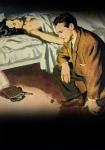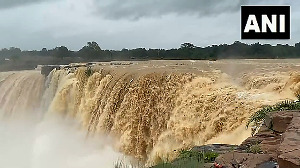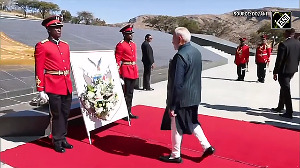It's 'hard not to share' an impression held by some victims' families that 'if it had been an Air Canada plane and Anglo-Saxons (on board), things would have been different,' he observed on October 4 during an exchange with Bob Rae, former Premier of Ontario, who was commissioned by former Liberal Government to write a report on Air India tragedy in 2005. In his report he suggested there should be a 'focussed, policy-based inquiry' and he was of the opinion that Canadians deserve to know more about how authorities assessed the terrorism threat and handled their investigation of the crime.'
Major raised the question of racism, observing whether "...racism, conscious or unconscious, may have played a role in public and government reaction to the Air India bombing on June 23, 1985."
Even though Rae didn't make any mention of racism, either in his report or in his statement before the Commission, he did notice some 'culturally driven issues' like translation of surveillance tapes of the Sikh suspects from Punjabi to English. There were not enough people capable of doing the translation. "That's not racism... but it certainly leads to ineffective surveillance," Rae said. "It means that you can't really understand what's going on, on a snap basis."
In his statement before the Commission, Rae emphasised that "...the (unaccompanied bag from Vancouver to Toronto to New Delhi) shouldn't have been allowed on Air India plane Kanishka without a passenger and that the "...bag should never have gone past the screening system without being detected in Toronto. It's one of those tragic situations where everything that could have gone wrong did go wrong and the consequences were simply disastrous for the people who were on board that flight."
Most family members have attributed racism as the factor for the Canadian government to wait 20 years before accepting Air India bombing and murdering of 329 innocent people as the Canadian tragedy, for them to take 21 years to finally appoint the public inquiry, and their unwillingness for years to meet victims families.
During the last 10 days, since the hearings commenced in Ottawa before Judge Major, dozens of family members have accused the government of racism with many of them arguing that had it been an Air Canada plane with White Canadians on board, Ottawa's reaction to the tragedy would have been different.
"The government totally neglected us," said Dr Padmini Turlapati in her testimony. She lost both her sons. Canadian Prime Minister Brian Mulroney sent condolences to Rajiv Gandhi" and that was despite the fact 80 percent of passengers on board flight 182 were Indo-Canadians.
Even at Cork (Ireland) soon after the tragedy as family members started scrambling, "there was no one from the Canadian embassy there,' she pointed out.
According to various reports, the Indian Civil Service "...were informed of a possible threat and took security measures to safeguard airports, bus stations, trains, etc." in India (and) the Canadian government was informed" but with what results, Tuirlapati asked. "At each step the system has failed us."
"The Canadian government was nowhere to be seen in Ireland," stated Lorna Kelly who lost her mother Barsa Kelly.
The Air India crime, the deliberate murder of 329 people, happened due to "...the glaring incompetence of Canadian government bodies and law enforcement" and then to add to the miseries of the families there was "ineffectual investigation and trial, the persona non-grata status that the families of the victims have had to endure have all served to punch a hole through our existence," she said.
This act of terrorism "...was planned and allowed to be executed in Canada," Kelly told Judge Major.
Bob Rae told the Commission of Inquiry that security measures in Canada would be 'different today' than what they were during June 1985. He told Judge Major his inquiry should still find out if everything that should be done has in fact been done to upgrade the system over the last 20 years.
Judge Major will conclude hearings by May 2007 and submit his report in September. He has no authority to reopen cases against Ajaib Singh Bagri or Ripudaman Singh Malik, as both these suspects were acquitted of all charges by British Columbia Judge Ian Josephson.
His mandate is to concentrate on security matters, on issues of anti-terrorism, transfer of money from Canada to other countries for terrorist activities, etc.






